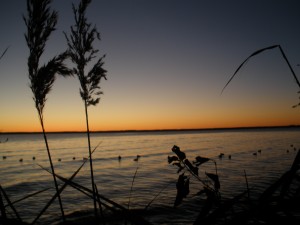Important to Everyone Who Cares About Wisconsin’s Waterfowl
An article from WWA’s Words From The Wardens.
This article originally appeared in Wisconsin Waterfowl Association’s December, 2020 eNewsletter.
As a proud Department of Natural Resources (DNR) conservation warden, I’m lucky to be based in Shiocton, serving Outagamie County, an area with real waterfowl potential.
However, a successful day out on the water rests on more than just water levels. It also depends on hunters being responsible, safe and choosing to pursue the sport with a strong sense of ethics. I realize I am likely preaching to the choir when I say hunter ethics remains a critical topic.
It’s important to make sure that we, as hunters, are being respectful and ethical. That means following rules and acting ethically toward other hunters, the game we are pursuing and the general non-hunting public.
Here are a few hunter ethics ground rules that we could all benefit from while we are out enjoying our state’s natural resources.
- Be Safe
 While on my patrols, I hear from folks concerned about shooting too close to houses while waterfowl hunting. I’m not just referring to the people who break the law by shooting within 100 yards of occupied dwellings, but also to people who set up in the middle of a field with houses all around and who end up hitting houses with BB’s they’ve shot.
While on my patrols, I hear from folks concerned about shooting too close to houses while waterfowl hunting. I’m not just referring to the people who break the law by shooting within 100 yards of occupied dwellings, but also to people who set up in the middle of a field with houses all around and who end up hitting houses with BB’s they’ve shot.
I understand that when you see hundreds of ducks and geese coming to a field, it can be tough to resist going out and taking your fair share with your buddies. However, when you are raining down BB’s on people’s houses, regardless of how far away you are hunting, it can tarnish the reputation of all hunters. It can also involve you in undesirable legal battles.
When hunters do things like this, it encourages some homeowners to talk with their local elected officials and ask to have hunting outlawed in those places. In turn, this ruins hunting for those who hunt in the same area, but choose more appropriate locations.
We all want to make the best impression possible with those around us and avoiding shooting too close to houses is a great start to doing so.
- Have More Than One Spot
If someone beats you to your hot spot, find another location. If there isn’t another spot nearby, ask if you can hunt with the group. Many friendships have begun this way, and you may even find a new hunting partner.
Avoid setting up in a location where it is likely that your shot will be going towards another group and respect the other folks out in the field.
Remember to keep COVID-19 safety measures in mind. Keep six feet of distance from others and wear a mask when around anyone outside your household.
- Respect The Game
Nobody likes to wound game and not be able to retrieve it. We should consider whether we can make the shot and whether we will locate the game after shooting it.
Things to consider when deciding what shots to take and where to set up include:
- Are you located next to a no-entry refuge or private land?
- Will the duck fall into tall brush that will make it difficult to find?
- Do you have a dog along?
It’s best to establish what kind of shots you want to take before the birds start flying. It’s easy to get excited and take a shot while realizing it was one you didn’t want to take as we watch the duck fall where we know we have a slim chance of finding it.
We cannot control all the variables in the field. Having a plan that includes respect for the game is a part of being an ethical hunter.
- Remember Shooting Hours
 Set an alarm on your watch or phone so you will be alerted when shooting hours begin or end.
Set an alarm on your watch or phone so you will be alerted when shooting hours begin or end.
As waterfowl hunters, we all know that if everyone could hunt after shooting hours, there would be many more limits of birds taken. I know all too well the feeling of sitting all afternoon and not shooting and then having ducks landing 10 yards away from me as I pick up my decoys after shooting hours.
Although it can be frustrating, shooting hours serve a purpose in managing waterfowl well. It is both unethical and unsafe to shoot outside of them. I’ve always used those 20 minutes after shooting hours to watch where ducks are landing and see where I should set up the next morning.
It is the hunter’s responsibility to know and follow the regulations. Please take the time to review them before your next hunt. If you have questions after reading the regulations, please feel free to contact the local warden to help answer your questions or concerns.
Thanks for reading and I hope to see you out there ethically enjoying the natural resources this state has to offer.

